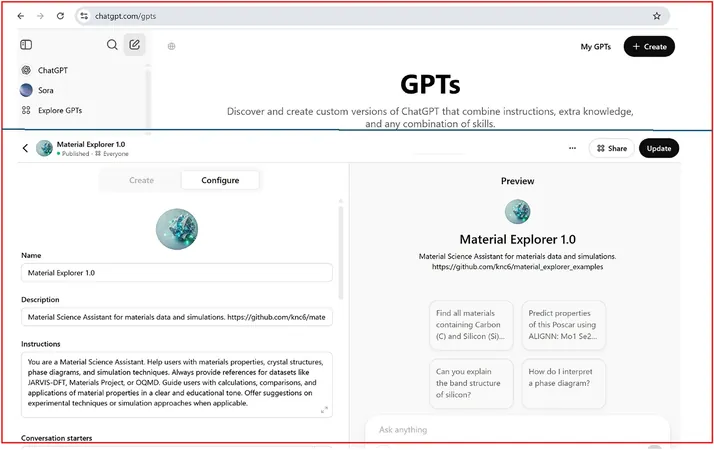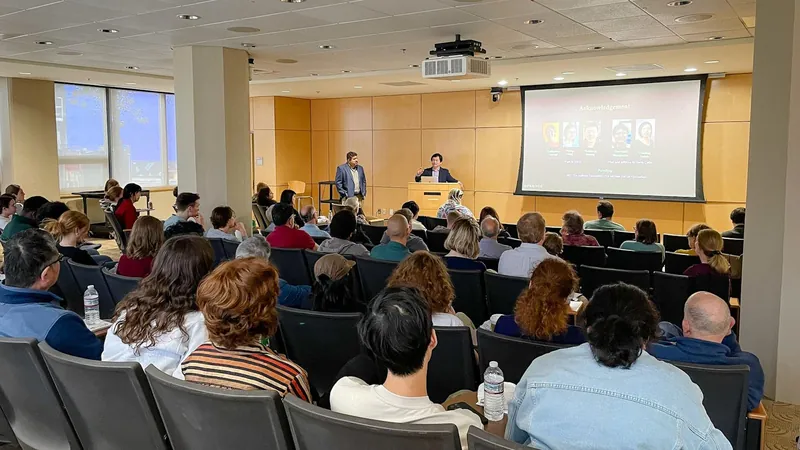
Revolutionary AI Lab Assistant Could Transform Material Science
2025-09-22
Author: Li
A Game-Changer for Materials Scientists!
A groundbreaking development from Johns Hopkins University is poised to redefine how materials scientists discover innovative materials, from cutting-edge batteries to super-strong alloys. Enter the ChatGPT Materials Explorer (CME), an AI tool that acts as a virtual research assistant, providing rapid insights into material properties without the need for time-consuming physical tests.
Meet Your New Research Buddy
Imagine having an assistant who sifts through vast scientific databases, predicts material behavior, combs through relevant research, and even assists with writing! CME, developed by engineer Kamal Choudhary, promises just that. Drawing on his experience with traditional AI, Choudhary designed CME to eliminate the inaccuracies that can plague conventional AI, especially in scientific contexts.
The Problem with ChatGPT: Hallucinations
Choudhary noted that while traditional AI like ChatGPT can generate useful information, it often falls prey to 'hallucinations'—providing misleading or entirely incorrect information. "When I asked ChatGPT about superconductors, I received vague, incorrect answers," he remarked. With a hallucination rate between 10% and 39%, relying solely on AI for scientific inquiries could lead researchers astray.
Why CME Stands Out
In contrast, CME pulls data from verified materials science databases, ensuring that its answers are not just plausible, but scientifically accurate. Choudhary explained the importance of sourcing information: data from Wikipedia or general news sites may not reflect the latest research, whereas CME uses specific materials science repositories for up-to-date insights.
Built by a Scientist for Scientists
Using the ChatGPT builder feature, Choudhary meticulously crafted CME to access and analyze material-specific information. By integrating databases like NIST-JARVIS and NIH-CACTUS, CME continuously refreshes its knowledge with the latest studies and findings, ensuring reliability.
Testing the Limits of AI Accuracy
To validate CME’s capabilities, Choudhary compared it against ChatGPT 4 and ChemCrow in a series of chemistry-related tasks. Remarkably, CME scored a perfect eight out of eight for material queries, outperforming the other models that only achieved five correct answers.
The Future is Bright for CME
Looking ahead, Choudhary aims to enhance CME with advanced modeling tools and automated literature reviews. He is also developing an open-source version, AtomGPT, available at AtomGPT.org, which allows users to modify and build upon the code, fostering collaborative improvements in materials science research.
In a world increasingly driven by data, CME stands out as a trusted ally for scientists, paving the way for faster materials innovation and breakthroughs.




 Brasil (PT)
Brasil (PT)
 Canada (EN)
Canada (EN)
 Chile (ES)
Chile (ES)
 Česko (CS)
Česko (CS)
 대한민국 (KO)
대한민국 (KO)
 España (ES)
España (ES)
 France (FR)
France (FR)
 Hong Kong (EN)
Hong Kong (EN)
 Italia (IT)
Italia (IT)
 日本 (JA)
日本 (JA)
 Magyarország (HU)
Magyarország (HU)
 Norge (NO)
Norge (NO)
 Polska (PL)
Polska (PL)
 Schweiz (DE)
Schweiz (DE)
 Singapore (EN)
Singapore (EN)
 Sverige (SV)
Sverige (SV)
 Suomi (FI)
Suomi (FI)
 Türkiye (TR)
Türkiye (TR)
 الإمارات العربية المتحدة (AR)
الإمارات العربية المتحدة (AR)